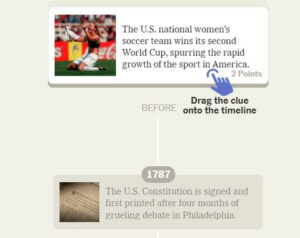Congratulations! Someone has asked you to help them turn their hobby into a small business.
This is great news both for you and your potential client. For many, this is where the wind catches the sails and a ton of work happens. However, it”s now time to take a deep breath and ask yourself if starting the project is what you should be doing at this point.
I have recently been given the opportunity to work with two new clients. One is a dear friend of mine who I have known for almost 15 years and the other is a pretty awesome EdTech company who has asked me to help them redesign their digital presence.
To be honest, when both of these opportunities came my way, it was exciting and my urge to jump in with both feet and run with the projects quickly consumed me. (notice that there hasn’t been a TeacherCast podcast in a while?) However, it was at this point when I remembered the importance of communication when starting new projects to make sure everyone is on the same page with the same goals.
Why is Communication Important?
I’m sure this has happened to you. You are pretty good at something and someone asks you to show how to do that particular skill. You get all excited and start teaching them to the best of your ability and suddenly find yourself in a situation where the learner is frustrated. It is only after you take a step back that you realize that you were teaching on Level 5 and your learner needed to start on Level 1.
Or, take another situation that I have often found myself in.
Someone comes up to you and asks how to “do YouTube”. You go off in a monologue for 30 min about the importance of Video SEO and how to keyword search your competitors using the best apps to dig into Keywords and Tags. It is at that moment you realize that the learner’s eyes have glassed over. You ask them what is wrong and they explain that they only wanted to know how to edit a quick video of their family and post it online.
The point is … when starting out on a project, it’s important to have everyone on the same page at the same time. This is why it’s important to consider 5 simple questions before jumping into what might be an incredible (or regretful) working relationship.
5 Important Questions To Have With Your New Client
What Are Your Clients Goals For This Project?
This is a big one! In the case of my friend. He came to me and told me that he wanted to learn how to use YouTube to start a channel that would help him bring in additional income to support his family. He has a clear goal in mind and together we are working on a plan to do so. This plan includes weekly audio and video content as well as a written component to go along with virtual musical performances he will be getting paid for. All of this will be funneled through a new website we are designing that will be created to entice his surrounding community to hopefully hire him for additional performances.
Knowing that financial stability is his goal, we are working on the minute details of creating SEO friendly blogs and studying what other musicians in his niche are doing to generate interest online. By looking at this situation through a business perspective it’s all about building marketing funnels across multiple medium to attract attention and build brand awareness. (more info on this coming soon after the website launches)
Is This A Business Or A Hobby?
Another great question. For many, creating a website is a hobby. Perhaps it makes a few dollars here or there, but it is not a vehicle designed to generate a mortgage payment. But what if it could do this?
In the case of my friend, his primary form of income is through his musical aspirations. The goal is to be able to take his knowledge, talents, and interests and move them from the concert hall into the virtual space. This is not going to be easy, but with the right focus, it has a ton of potential.
When working with new clients, friends, or any group who approaches you, having a basic understanding of where this project lands on their priority list is super important. Is this project something that they are willing to sacrifice family time for? If this answer is yes then it’s a business … if the answer is no, then it’s a hobby.
How Do You Define “Successful?”
When I created TeacherCast in 2011, I created a website that was simply a place for me to put my digital things. Over time, it grew into a very successful and recognizable educational brand. For me, this is a success. For others, success could be defined as something completely different.
Having a conversation with your client about what they deem to be successful is of utmost importance. Getting a podcast to 50 downloads a week for many is a success. Getting 50,000 is also a success. How do you determine what defines success? The answer is simple … have that conversation.
A friend of mine in Texas recently went all-in on his YouTube channel. I remember him sharing his screenshot a few months back of getting his first 1000 subscribers. Then he hit 3000 subscribers and then 5000 and now he is at 10,000. Each of these benchmarks is a success. However for this creator, he doesn’t seem to call it a success because, even though he’s getting subscribers, the channel is not converting into dollars each week or speaking opportunities.
Having a clear idea of what is and what isn’t successful for both the client and the project is extremely important when planning the next few weeks to months of your life.
How Much Time Will They Be Spending On The Project Each Week
Everyone has one thing in common. We each have only 24 hours in a day and we all have to sleep for a few of them. When taking on a client, it’s good to know upfront how much time they will be looking to devote to the project each week. Is the project going to be a full-time job for them or is it going to be a weekend-only thing?
If you take podcasters and podcasting for example, it’s easy to sit down with your phone and create a 5-10 min podcast. It’s another thing to go through the steps of planning, organizing, finding guests, and creating show notes … not to mention all of the time it takes to record, edit, publish and promote. Some are interested in working on the surface and some are interested in jumping in cannonball style and getting not just themselves, but the entire world wet.
Have you ever been asked to help out with a project and after several hours of planning and putting things together for them you find that they didn’t pull their weight and were looking for you to do all of the work? Yeah … me too and this is why asking the question about time commitments is on this list.
What Do You Need From Me?
Probably the hardest question to have with a future or even a current client. This is not just a question of time, but a question of worth and value.
What does your client need from you? How much is your time worth to them?
If the client is paying you then this is an easy question. You have time and dollars and expectations to balance out.
If the client is not paying you and you are giving of your time then you need to weigh the value of what you are being asked to do with what you can or should be doing outside of this relationship.
Some of my clients bring me on to do a ton of work for them and I’m always happy to provide the service. Other clients bring me into their group simply to bounce ideas off of. I love being a part of both of these scenarios because I always find something that I can learn and walk away with.
Having a clear objective for the client/mentor relationship is always vital before any project starts.
What Should You Do If You Are Asked To Mentor Someone?
Do you have clients? Are you looking to get clients? Do you know where to find clients?
Being a mentor to a friend, or business, or even a total stranger is a big responsibility that shouldn’t be taken lightly. My advice to anyone in this situation is to know your role, know what expectations you have for them and they for you. Most importantly be professional no matter what happens.
What do you think? What questions do you ask your current or future clients before you start your projects? Please leave comments below.
#Simple #Questions #Future #Clients #Build #Brand #Identity





More Stories
How to Write a Good Email Signature so others will Notice You
Part 3: Why Singapore Math?
Add BookWidgets to Your Next Google Classroom Assignment! – The TeacherCast Educational Network